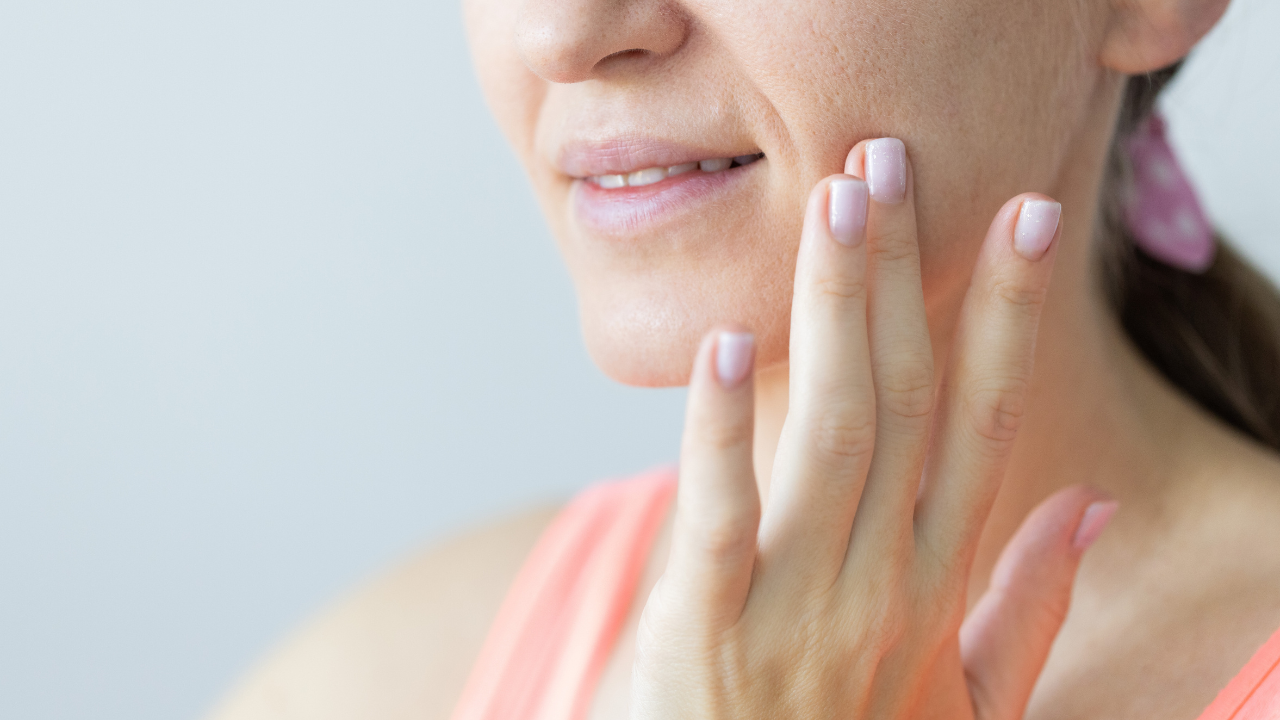Dry Mouth During Menopause
Dry mouth, also known as xerostomia, is a common but often overlooked symptom of menopause. Characterized by a persistent lack of saliva, dry mouth can lead to discomfort, difficulty eating or speaking, and even dental health issues.
At Evolve Telemedicine, we provide personalized care plans to address dry mouth and other menopause symptoms, helping you find lasting relief.
What Causes Dry Mouth During Menopause?
Dry mouth during menopause is primarily caused by hormonal fluctuations, particularly the decline in estrogen levels. Estrogen plays a role in maintaining healthy salivary glands, and reduced levels can impact saliva production.
Key Contributing Factors:
- Hormonal Changes: Declining estrogen levels reduce salivary gland function, leading to decreased saliva production.
- Dehydration: Menopause-related changes may increase the risk of dehydration, exacerbating dry mouth.
- Medications: Certain medications for menopause symptoms, like antidepressants or antihistamines, can cause dry mouth as a side effect.
- Lifestyle Factors: Smoking, alcohol consumption, or excessive caffeine intake can worsen symptoms.

How Common Is Dry Mouth During Menopause?
Studies suggest that dry mouth affects approximately 20-25% of menopausal women. While not as widely discussed as hot flashes or mood swings, dry mouth can significantly impact daily life and oral health if left unmanaged.
Did you Know?
Saliva plays a critical role in protecting teeth and gums. Reduced saliva production can increase the risk of cavities, gum disease, and bad breath.
Signs and Challenges of Dry Mouth
Common signs of dry mouth include:
- Persistent Dryness: A constant feeling of dryness or stickiness in the mouth.
- Difficulty Swallowing or Speaking: Reduced saliva can make eating or talking uncomfortable.
- Chronic Thirst: Feeling the need to drink water frequently.
- Bad Breath: Caused by the lack of saliva’s natural cleansing properties.
- Dental Issues: Increased risk of cavities and gum disease due to reduced saliva production.


Tips for Managing Dry Mouth During Menopause
- Stay Hydrated: Drink plenty of water throughout the day to support saliva production.
- Use Saliva Substitutes: Over-the-counter mouthwashes or sprays can help mimic saliva.
- Chew Sugar-Free Gum: Stimulate saliva production with gum or lozenges containing xylitol.
- Avoid Irritants: Limit caffeine, alcohol, and smoking, which can worsen dryness.
- Practice Good Oral Hygiene: Brush and floss regularly to protect teeth and gums.
Can Hormone Replacement Therapy (HRT) Help?
Yes, HRT can help alleviate dry mouth by addressing the hormonal imbalances that affect salivary gland function. By stabilizing estrogen levels, HRT supports healthy saliva production and reduces the discomfort associated with dry mouth.
Benefits of HRT for Dry Mouth:
- Improves salivary gland function.
- Enhances oral health by reducing dryness and irritation.
- Addresses other related menopause symptoms, such as dehydration and sleep disturbances.
Evolve Telemedicine offers personalized HRT plans tailored to your individual needs, ensuring effective relief from menopause-related symptoms.

FAQs About Dry Mouth and Menopause

Declining estrogen levels affect the salivary glands, reducing saliva production and leading to dryness.
Yes, lifestyle changes, saliva substitutes, and treatments like HRT can significantly reduce symptoms.
Yes, if untreated, dry mouth can increase the risk of cavities, gum disease, and bad breath.
HRT stabilizes hormonal levels, supporting salivary gland function and improving oral health.
We provide personalized care plans, including HRT and lifestyle recommendations, to address dry mouth and other menopause symptoms.
Take Control of Skin Health Today
Menopause-related itchiness doesn’t have to disrupt your daily life. Evolve Telemedicine provides expert guidance and personalized treatments to help you restore skin hydration and comfort.
